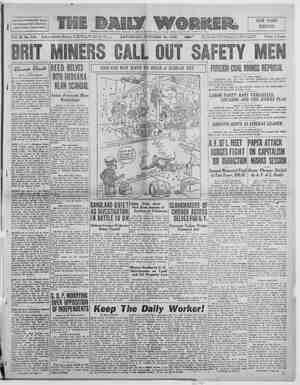The Daily Worker Newspaper, October 16, 1926, Page 7
You have reached the hourly page view limit. Unlock higher limit to our entire archive!
Subscribers enjoy higher page view limit, downloads, and exclusive features.
5 ere (ne a REI C= — ¢ ‘ ALEX. BITTELMAN, Editor. ret + THE DAILY WORKER. Second Section: This Magazine Section Appears Every Saturday In The DAILY WORKER, SATURDAY, OCTOBER. 16, 1926 | Triumphant Reaction in the Trade Unions v, EAE ‘gf vention of the Americam. Federation s): J f of Labor can be summaritéd in a few y 4 words. It is triumphant, brazen and self-satisfied reaction. . In this there is little of a surprising nature. A. F. of L. conventions: are 8® organized as te prevent almost completely rank and fie expression. The protesting voice of the outraged, exploited and betrayed masses is not heard tm these conventions. It is the reactionary bureaucrat, the corrupt faker, the brazen servant of the em ployers who bosses and dominates the proceedings. gs i Matthew Woll, William Green, Wilk son, Lewis, Walker and a host of oth ers—what is the labor movement te them? An object of exploitation. A means of enrichment. A stepladder to money, power\and Imxury. These are the people that dominated the Detroit convention, Is it any wonder that the convention went into a fit of frenzy when Sher wood Eddy mentioned favorably the Soviet Union? Is it. surprising fiat the convention reaffirmed its déterm! nation not to lead the workers into struggle against the employers under the mask of cooperation with the cap italists? The true voice of the masses, which ils expressed by the ieft wing, was not heard there. It could not pene trate the thick walls of feaétion '@nw the undemocratic machinery. But | voice is present and alive. The frem zied attacks upon the left wing, the Trade Union Educational League and William Z. Foster bear witness to this fact. The struggle will go on and essehi Se tiles, the victory belongs to the masses, Here Is the Queen! ba may not believe us, But this is the picture of the Queen of Rou- mania as she looks thru our specta- cles. Of course, a queen is a queen. and far be it from us to say other- wise, but some evil-minded persons have associated Marie with people whose conception of morality is about as elastic as a check autographed by a confidence man, It is this way. Roumania is a small conntry and in this peried of capitalist imperialism small countries are us- ually in trouble, because they have very little to lose except oil wells. If they have oil wells they are in de- mand; if they have not they are granted the right of self-determina- tion. Roumania developed into something Frankly, the reason why the queen of Roumania ig coming here is be- cause Roumania is broke and the queen is the’ country’s foremost: pan- handler. There are some oil wells in Roumania. Rockefeller has a mort- gage on them. Naturally John Q, will use his influence to make things easy for the queen, Bassarabia comprises a large piece of land that was stolen from Russia by Roumania when Woodrow Wilson helped to write the treaty of Ver- sailles. If Marie makes a hit in the United States, perhaps our solons may be more susceptible to accepting the status quo, There are other reasons why the queen should come here, but as far as the workers are concerned this old parasite represents one of the reactionary ruling classes in Europe and every worker should look on her as an enemy. : Sherwood Eddy at the ¢ A. F. of L. Convention DETROIT, 1926. To the Tune of Yankee Doodle, O Mister Green! © Mister Green! Aint Eddy awful naughty? Such naughty boys are seldom seeng To praise the Bolshes sought he. - This wicked Eddy dared to raise His voice at the convention, Though mixed with slams, he dared to praise Those whom to only mention. Makes Mister Green and Woll and Frey And other labor fakera, Throw a fit and rage and cry Like holy roller shakers. © Mister Green! O Mister Green! Aint Eddy awful naughty? Such naughty boys are seldom seen; To praise the Boishes sought he. Adolph Wolff,



